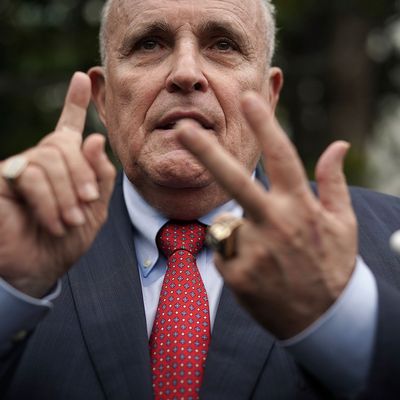
Joe Biden’s presidential campaign sent a letter to the major television networks’ heads and hosts on Sunday demanding they stop allowing Rudy Giuliani on the air, since Giuliani, who is President Trump’s personal lawyer, uses much of that airtime to spread unsubstantiated or debunked allegations about Biden and his son. His media appearances have proliferated recently as Giuliani has tried to deny or defend his and Trump’s efforts to pressure the Ukrainian government to open a politically damaging investigation into Biden, efforts that so alarmed an intelligence-community member working in the White House that they filed a formal whistle-blower complaint, which subsequently led to a formal impeachment inquiry into the president.
Giuliani, Trump, and the president’s allies have meanwhile worked to shift the focus to Biden and his son Hunter, who has had business relationships in Ukraine that began while his father was still the vice-president. There is no evidence to support the Trump team’s allegations, but they continue to talk about them as loudly as they can anyway, and Giuliani is one of their loudest voices on the mainstream air. The former mayor of New York has been trying to get Ukraine to investigate the Bidens since at least May and has always seemed more than happy to publicize his efforts. He also has a talent for creating controversy and confusion with his television appearances, and has had countless opportunities to do so as one of the president’s most tireless defenders.
Now the Biden campaign wants to cut his microphone, arguing to the networks that “by giving him air time, you are allowing him to introduce increasingly unhinged, unfounded and desperate lies into the national conversation” and emphasizing that Giuliani has “demonstrated that he will knowingly and willing lie in order to advance his own narrative.”
These are hardly new concerns regarding political coverage and the symbiotic — and often toxic — relationship between the media and the political class. It is criticism that has only gotten louder and more desperate in the Trump era. Excessive, spectacle-hungry media coverage was an essential factor in Trump’s political rise, and it’s something the television-addicted president has continued to feed on. Thankfully, the political media has evolved over the past few years — at least to the point where each and every Trump tweet no longer becomes its own unique news cycle — but there’s a lot more work to do. Biden’s campaign is correct when it notes in the letter that the expanded use of on-air, real-time fact-checking isn’t enough. It’s a welcome and useful tool, but it can’t address every false thing politicians say, erase what they’ve said, or counteract the amplification that TV hits reliably afford Trump, Giuliani, and the many others who regularly mic-up to blast out the gaslit recriminations, straw men, and threats from Planet Trump. (And to be clear, no party or presidency will ever have a monopoly on self-serving bullshit.)
The Biden campaign’s lecture goes on to list examples of Giuliani’s truth-defying feats, note he’s not a public official with some right to the airwaves, and highlight how often he contradicts himself. The campaign implores the networks — and the other members of the media whose attention the letter would undoubtedly attract — to think of the viewers, whom Giuliani “is not enlightening [in] any way” nor “offering a unique or informed perspective.” The campaign also asked that equal time be awarded to Biden-campaign surrogates should the networks continue to invite Giuliani on the air.
This Week and Face the Nation apparently rejected the campaign’s request to do that earlier Sunday.
Giuliani, responding to the Daily Beast about the Biden camp’s letter, called it an attempt at “left-wing censorship.”
He probably doesn’t have to worry about that. The networks will almost certainly keep having him on, especially now that impeachment seems finally upon us. Giuliani isn’t just some spinning commenter, but the president’s attorney and primary collaborator in the scandal. His appearances are also undoubtedly considered good news-making television by many, regardless of any damage they may also do to the country or our understanding of logic. After all, what other Trump official can be counted on to regularly implicate other officials and/or admit the very things he is trying to deny live on the air.
Biden and his campaign are surely frustrated, and they have a right to be. The ultimate purpose of the act the president may soon be impeached for — saddling Biden with a noisy, made-up scandal that can both inspire Trump-rally chants and confuse swing voters like Hillary Clinton’s emails did — is much more likely now than it was before the whistle-blower complaint emerged.
Perhaps Biden’s campaign can successfully ramp up pressure on producers and hosts to be extra vigilant regarding Giuliani’s disinformation efforts, or even overcompensate against them. But Giuliani is a symptom of a larger, older problem that will remain even if his remarks are quarantined to Fox News and OANN — or if Trump is impeached, removed from office, and ends up as the controversial new judge on Dancing With the Stars.






























